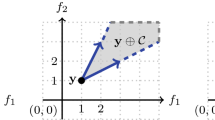Abstract
In this paper, we consider the problem of scheduling independent jobs when several agents compete to perform their jobs on a common single processing machine. Each agent wants to minimise its cost function, which depends exclusively on its jobs and we assume that a global cost function concerning the whole set of jobs has to be minimised. This cost function may correspond to the global performance of the workshop or to the global objective of the company, independent of the objectives of the agents. Classical regular objective functions are considered and both the ε-constraint and a linear combination of criteria are used for finding compromise solutions. This new multi-agent scheduling problem is introduced into the literature and simple reductions with multicriteria scheduling and multi-agent scheduling problems are established. In addition, the complexity results of several problems are proposed and a dynamic programming algorithm is given.
Similar content being viewed by others
References
Agnetis, A., Mirchandani, P. B., Pacciarelli, D., & Pacifici, A. (2000). Nondominated schedules for a job-shop with two competing users. Computational and Mathematical Organization Theory, 6, 191–217.
Agnetis, A., Mirchandani, P. B., Pacciarelli, D., & Pacifici, A. (2004). Scheduling problems with two competing agents. Operations Research, 52, 229–242.
Agnetis, A., Pacciarelli, D., & Pacifici, A. (2007). Multi-agent single machine scheduling. Annals of Operations Research, 150, 3–15.
Baker, K., & Smith, J. C. (2003). A multiple-criterion model for machine scheduling. Journal of Scheduling, 6, 7–16.
Balasubramanian, H., Fowler, J., Keha, A., & Pfund, M. (2009). Scheduling interfering job sets on parallel machines. European Journal of Operational Research, 199(1), 55–67.
Cheng, T. C. E., Ng, C. T., & Yuan, J. J. (2006). Multi-agent scheduling on a single machine to minimize total weighted number of tardy jobs. Theoretical Computer Science, 362, 273–281.
Cheng, T. C. E., Ng, C. T., & Yuan, J. J. (2008). Multi-agent scheduling on a single machine with max-form criteria. European Journal of Operational Research, 188, 603–609.
Garey, M. R., & Johnson, D. S. (1979). Computers and intractability: a guide to the theory of NP-completeness. San Francisco: W.H. Freeman.
Graham, R. L., Lawler, E. L., Lenstra, J. K., & Rinnooy Kan, A. H. G. (1979). Optimization and approximation in deterministic sequencing and scheduling: a survey. Annals of Discrete Mathematics 5, 287–326.
Hall, N. G., & Potts, C. N. (2004). Rescheduling for new orders. Operations Research, 52(3), 440–453 +496.
Hoogeveen, H. (1992). Single machine bicriteria scheduling. PhD Thesis, Amsterdam.
Hoogeveen, H. (2005). Multicriteria scheduling. European Journal of Operational Research, 167, 592–623.
Hoogeveen, H., & Van de Velde, S. (1995). Minimizing completion time and maximum cost simultaneously is solvable in polynomial time. Operations Research Letters, 17, 205–208.
Huo, Y., Leung, J. Y.-T., & Zhao, H. (2007). Complexity of two dual criteria scheduling problems. Operations Research Letters, 35, 211–220.
Huynh Tuong, N., Soukhal, A., & Billaut, J.-C. (2009). Complexity of partition problem with distinct elements (Research report num. 295), University of Tours, France, March.
Mocquillon, C., Lenté, C., & T’Kindt, V. (2006). Solution of a multicriteria shampoo production problem. In IEEE international conference on service systems and service management (IEEE-SSSM’06), Troyes (France) (pp. 907–911).
Nelson, R. T., Sarin, R. K., & Daniels, R. L. (1986). Scheduling with multiple performance measures: the one-machine case. Management Science, 32(4), 464–479.
Ng, C. T., Cheng, T. C. E., & Yuan, J. J. (2006). A note on the complexity of the problem of two-agent scheduling on a single machine. Journal of Combinatorial Optimization, 12, 387–394.
Pessan, C., Bouquard, J.-L., & Neron, E. (2008a). An unrelated parallel machines model for an industrial production resetting problem. European Journal of Industrial Engineering, 2(2), 153–171.
Pessan, C., Bouquard, J.-L., & Neron, E. (2008b). Genetic branch-and-bound or exact genetic algorithm. In Lecture notes in computer science (Vol. 4926, pp. 136–147). Berlin: Springer.
T’kindt, V., & Billaut, J.-C. (2006). Multicriteria scheduling: theory, models and algorithms (2nd ed.). Berlin: Springer.
Wu, S. D., Storer, R. H., & Chang, P.-C. (1993). One-machine rescheduling heuristics with efficiency and stability as criteria. Computers & Operations Research, 20(1), 1–14.
Yuan, J. J., Shang, W. P., & Feng, Q. (2005). A note on the scheduling with two families of jobs. Journal of Scheduling, 8, 537–542.
Author information
Authors and Affiliations
Corresponding author
Rights and permissions
About this article
Cite this article
Huynh Tuong, N., Soukhal, A. & Billaut, JC. Single-machine multi-agent scheduling problems with a global objective function. J Sched 15, 311–321 (2012). https://doi.org/10.1007/s10951-011-0252-y
Published:
Issue Date:
DOI: https://doi.org/10.1007/s10951-011-0252-y




